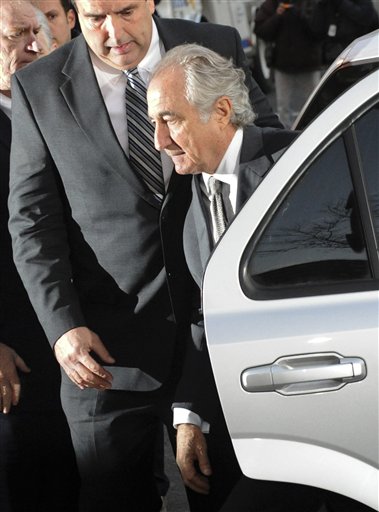In this age of millisecond attention spans and minimally talented celebrity demigods, it will take about two weeks before everyone forgets Mark Madoff.
Wasn't he the son of the crook? Wasn't he the one who killed himself?
Yes and yes.
The 46-year-old eldest son of Bernard Madoff — who, with his brother, turned his father over to the authorities two years ago after hearing the Ponzi mastermind's confession of guilt —
committed suicide Saturday, leaving four children from two marriages.
Although he spent most of his career as a trader at his father's firm, he claimed he never knew about the swindle.
We'll probably never know if he did or didn't. While it strains credulity that a multibillion dollar fraud can be going on within the confines of a small family-run firm with only one man knowing about it, there's no doubt it can happen. The personalities behind family businesses are just as weird and bizarre as those in corporate America, so it's entirely possible that Dad did his thing (the scam) while Uncle Peter and brothers Mark and Andrew did their thing (trading) with little or no interaction.
The fact is, Bernard L. Madoff Investment Securities LLC was a lot like other successful and idiosyncratic family businesses. While it may have been “Wall Street” in the eyes of the public, the company was a lot more Seventh Avenue in its origins than people realized. The company started by trading New York Stock Exchange-listed stocks away from the exchange, making a few cents here and there on every trade — sort of like a clothing manufacturer who knocks off designer dresses.
The firm grew as trading volume soared in the 1980s, and was providing a nice living for Bernie, his brother and their families before the Ponzi scheme began. (How sad that Bernie didn't stop at that point instead of feeling compelled, for whatever twisted reason, to pursue even bigger dreams of wealth.)
The successful business also provided second-generation family members with financial rewards and power far in excess of what they probably would have earned or commanded on their own in the outside world. For them, struggle and financial insecurity were alien concepts relevant only to the previous generations.
So here is Mark at midlife: a handsome, wealthy man who went to good schools, married attractive women and lived the good life — a Manhattan apartment in trendy SoHo, a home in Connecticut, flights on private jets, vacations in the right places, friendly with other wealthy and prominent New Yorkers. Whether or not he earned his good fortune, he was living the American dream.
Then it all fell apart.
His business not only collapses, it turns out to be the home of the biggest fraud in history. Dad goes to jail. The feds take the money. Mom moves to Florida; you stop talking to her. Most everyone else stops talking to you while those who don't keep hounding you about your father's crime and your role in it. For anyone, the stress would have been enormous. For someone whose life path was gilded, it must have been awful.
That Mark saw no alternative to taking his life is a tragedy. It is also a tragedy for his wife and four children, who will be scarred forever. I even think that his cremation without a funeral service is a tragedy for family and friends, in that his passing went by unmarked.
While in no way minimizing the tragic fate of Bernie Madoff's other victims, one can't help but feel immensely sad for Mark, whether he knew or didn't know. May he rest in peace.







